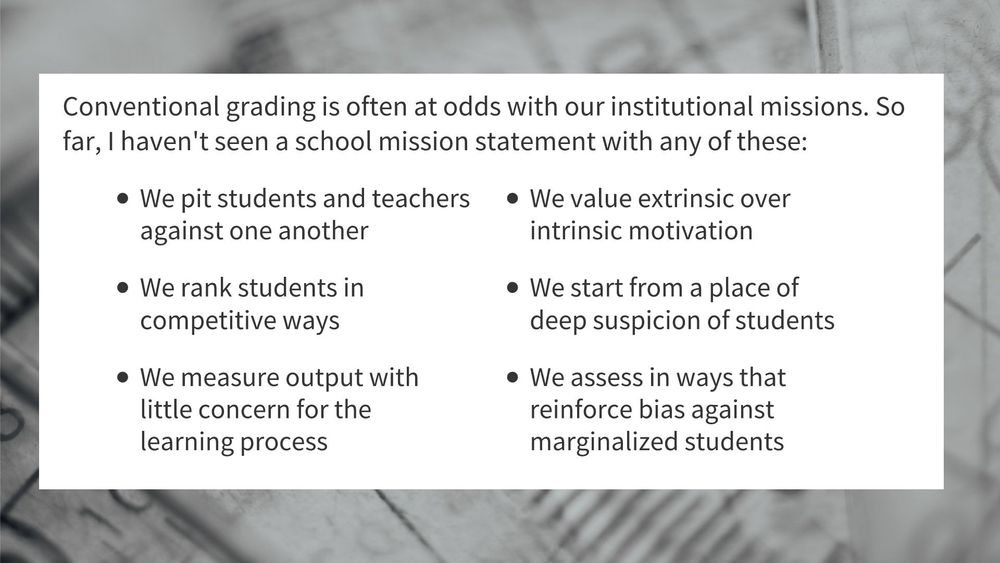Jesse Stommel on ungrading#
Summary and reflections on a twitter thread on ungrading from Jesse Stommel
Ungrading: an Introduction#
Problem with grades#
I would argue grading, by any of our conventional academic metrics, undermines the work:
- Grades are not good incentive.
- Grades are not good feedback.
- Grades encourage competitiveness over collaboration.
- Grades are not good markers of learning.
- Grades don't reflect the idiosyncratic, subjective, emotional character of learning.
- Grades aren't “fair.”
Origins of grades#
- Prior to 1700s, performance and feedback are idiosyncratic
- First grading apparently in 1785, in Yale
- A-F systems emerged in 1898 and "E" in the 1930s
- 100 point scale/% common in the early 1900s.
- Letter grades not widely used until 1940s, in 1971, 67% of primary & secondary schools using them
- "objective" grading created to scale systematised schooling.
"Toward standardization and away from subjectivity, human relationships, and care.
Good demo re: institutional mission statements
Academic misconduct#
Cites research that shows academic integrity has been an issue since at least the 60s.
Alternatives#
Freire and "problem-posing education" - start by trusting students.
Alternative Forms of Assessment:
- Minimal Grading: Using scales with fewer gradations to make grading “simpler, fairer, clearer” (Elbow)
- Contract Grading: Grading contracts convey expectations about what is required for each potential grade. Students work toward the grade they want to achieve, and goalposts don’t unexpectedly shift.
- Authentic Assessment: Having students write for real-world audiences, focusing on intrinsic motivations, and drawing students into the design of assignments / assessments.
- Process Letters: Asking students to reflect on their work and offer feedback on those reflections. Students help guide the grading of their own work.
Process#
- Start with teachers talking to students about grades and the culture, give student a sense of ownership
Small steps
- Change how you talk about assessment: Ungrading works best as part of a holistic pedagogical practice. Use words like "ask" or "invite," rather than "submit" or "required." Ask students about their expectations for their work, rather than centering yours.
- Invite students to a conversation about grades: Ask students how being graded makes them feel, how it affects their motivation. As a group, read and discuss a piece like Alfie Kohn's "The Case Against Grades."
- Grade less stuff, grade less often, grade more simply: Create space in your course for discovery and experimentation. Use a grading scale that feels less arbitrary and communicates more clearly to students. Ask students to do work that you don't "collect."
- Ask students to reflect on their own learning: Even if you change nothing else about how you grade, ask students when and how they learn. Ask what barriers they face. Listen. Believe the answers.
